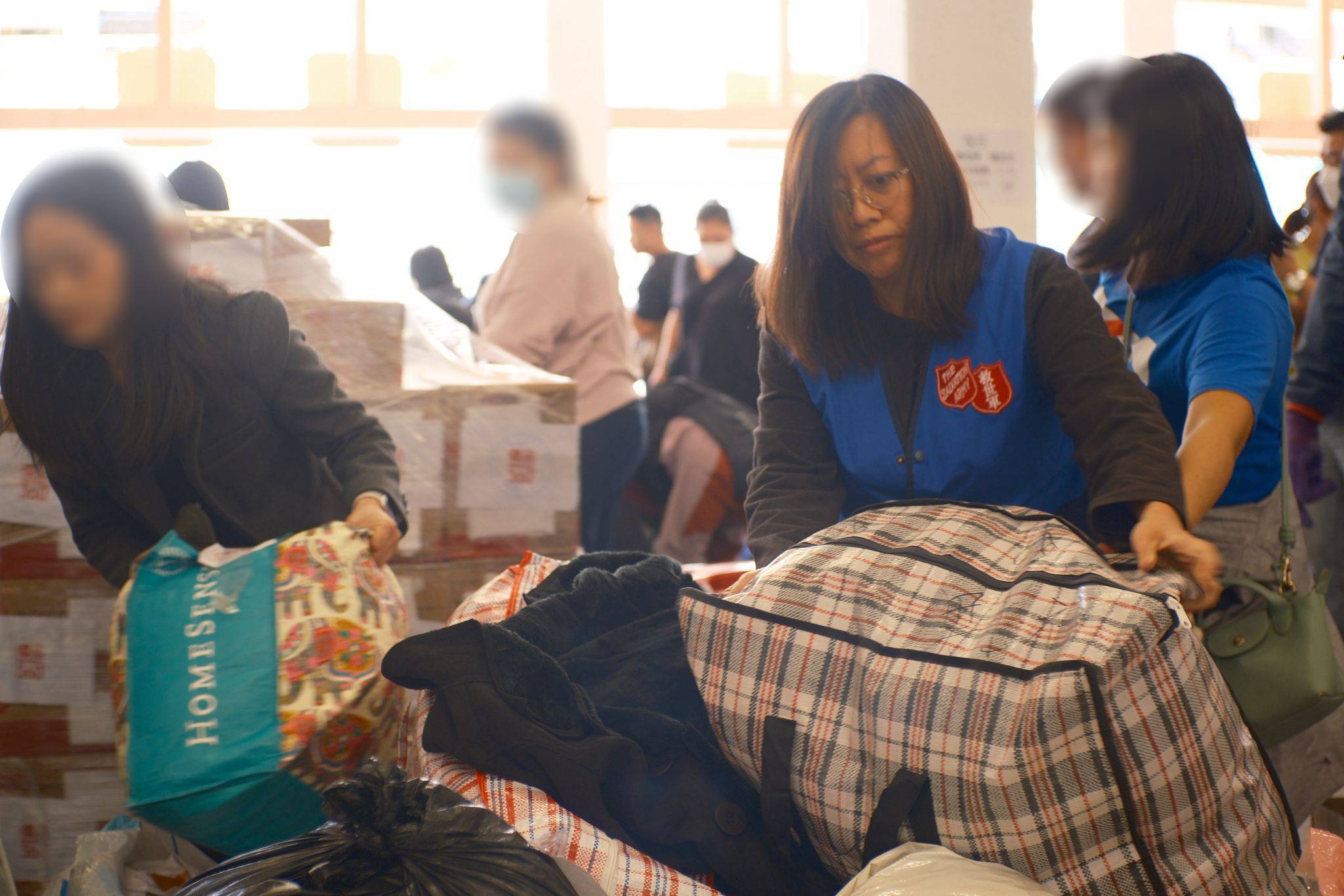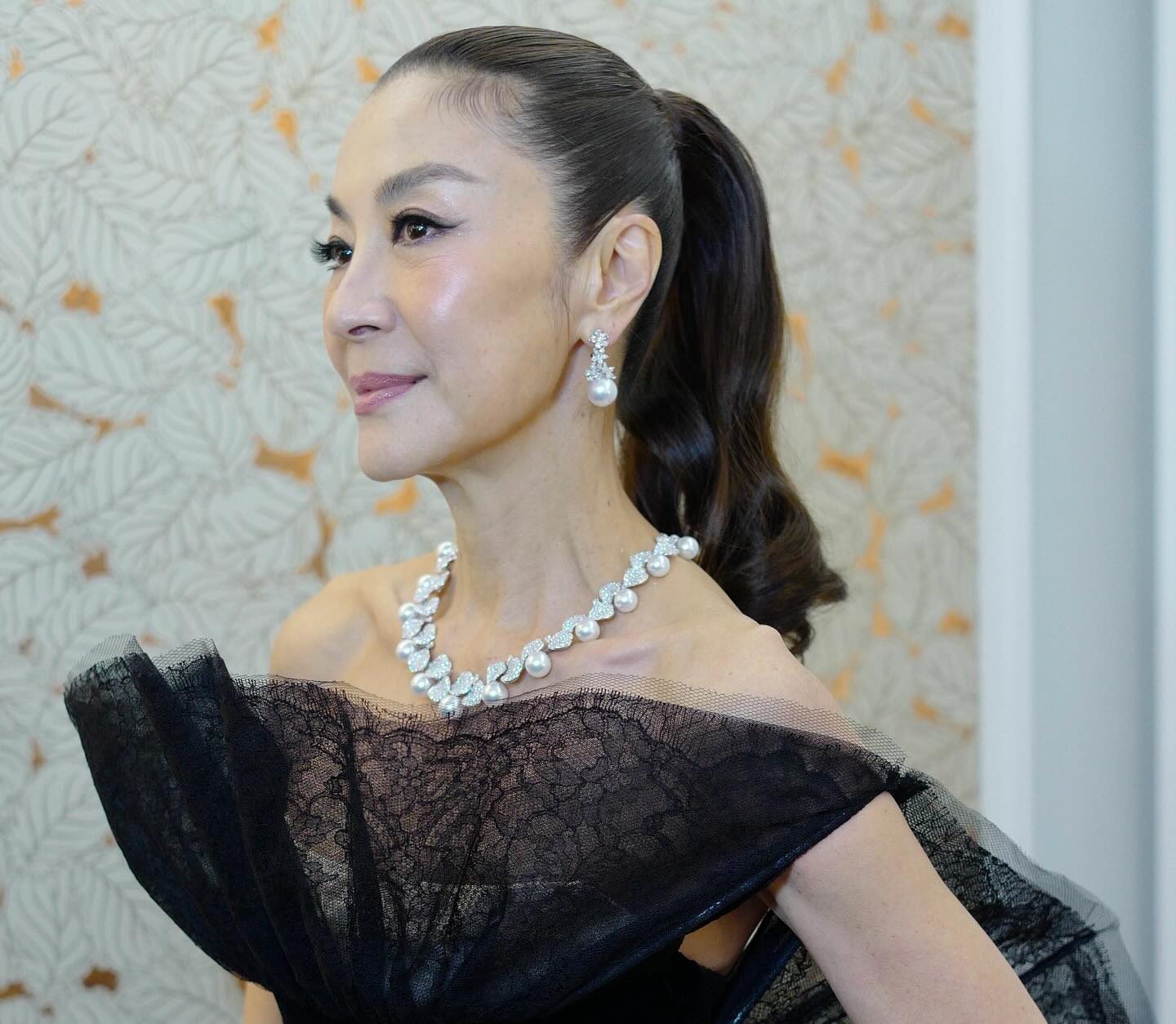As part of The Landmark Mandarin Oriental’s 20th-anniversary celebrations, all four of Hong Kong’s Michelin Green Star recipients – Amber, Roganic, Feuille and Mora – gathered under one roof for one night only to push the conversation forward on good cooking and sustainability. Chefs Richard Ekkebus, Joris Rousseau, Adam Catterall and Vicky Lau speak to Stephenie Gee
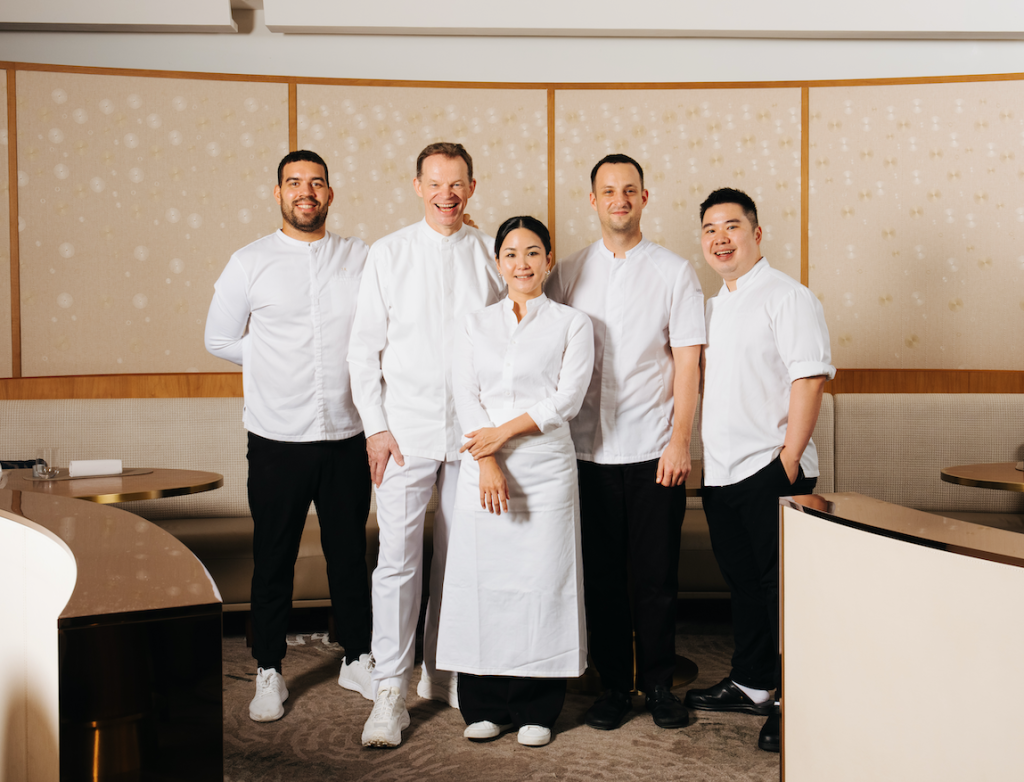
When renowned culinary guide Michelin launched its Green Star award in 2020, it was a decision met with both celebration and criticism. That the world’s leading authority on gastronomic excellence began to recognise restaurants with a focus on sustainability was not the issue, more that it had taken so long. People are increasingly discerning with their food choices, whether eating at home or dining out, and care more than ever about the impact the restaurants they visit are having on the environment.
Created to encourage, in Michelin’s own words, “the transformation of gastronomic cuisine towards a model that combines ecological responsibility and restaurant know-how”, there are currently 642 restaurants around the world recognised
as being worthy of the distinction. In Hong Kong, British chef Simon Rogan’s Roganic was the first to receive the accolade in 2021, followed by Richard Ekkebus’ Amber, Vicky Lau’s Mora, and the latest recipient, David Toutain’s Feuille, overseen on the daily by executive chef Joris Rousseau.
For one night only on August 25, the four came together in a first- of-its-kind collaboration for The Changemaker’s Dinner, the first in a series of exclusive culinary experiences to celebrate The Landmark Mandarin Oriental’s 20th anniversary. Hosted at Amber, the event showcased each chef’s distinct approach to cooking but was guided by a shared devotion to sustainability, seasonality and craftsmanship.
From Mora, best known for its novel use of soy as a sustainable, multifaceted ingredient, there was soft tofu custard with caviar and sweet shrimp, finished with a vibrant trio of oils. Staying true to Roganic’s farm-to-table, nose-to-tail philosophy, head chef Adam Catterall presented oyster mushrooms and miso grains with slow- cooked egg yolk and burnt chives. Feuille’s Rousseau, meanwhile, showcased his reverence for nature with his vegetable-driven dish of thinly sliced A4 wagyu layered with matsutake, served with Thai basil mustard and baked Yunnan potato. Ekkebus’ strawberry dessert with salt tomato, rose water, white Vao chocolate and chickpea meringue reflected his distinct zero-waste, “responsible fine dining” culinary ethos – where cream, milk and butter are replaced with substitutes like soy, rice, nut milks and vegetable-based oils; salt is distilled from the natural umami of seaweed; and sugar replicated through natural ingredients such as agave, maple and honey.
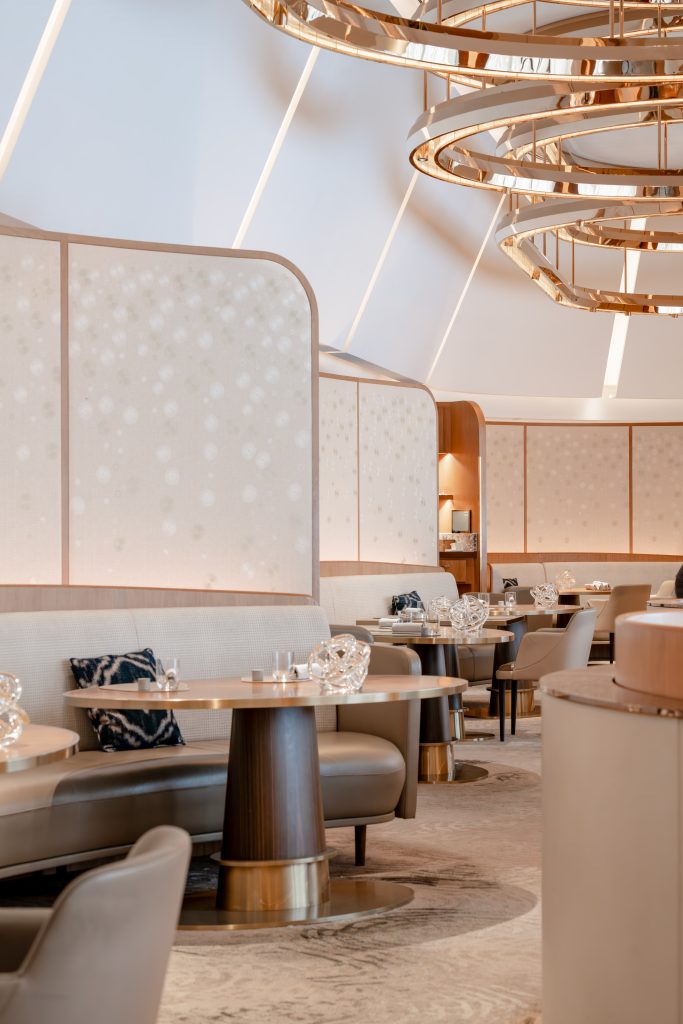
This was the first time the four of you collaborated together. Was there a mission or message you wanted to convey?
Richard Ekkebus: For our 20th anniversary, we’re thrilled to present a series of extraordinary events featuring some of the world’s most renowned chefs, collectively holding over 30 Michelin stars along with Michelin Green Stars. It’s no coincidence that we begin with sustainability-focused events. This choice is deliberate, carrying a powerful message: our future depends on how we care for our planet. As a chef, I’ve witnessed firsthand the profound changes impactingthe ingredients that arrive in our kitchens: their size, origin and even the shifting of seasons. These transformations have underscored the urgency of driving a change within our industry. The chefs we’re showcasing are true pioneers, shaping the future of gastronomy with their vision, values and commitment to sustainability. They represent not just the future of our craft, but the future of humanity and our planet.
Joris Rousseau: Sustainability is the key to a healthy future, but it doesn’t mean “restriction”. The most exciting part about this collaboration was being able to gather in this culinary setting and promote sustainability at a creative level. The kitchen is a place where you learn every day. When four chefs come together around a common project but with different perspectives, the idea of learning from peers takes on its full meaning.
Adam Catterall: Unity in purpose. We hope this collective effort can highlight the importance of shared responsibility when it comes to the environment. We want our diners to celebrate local ingredients, embracing seasonality and the amazing growers we have in Hong Kong. We also would like to encourage them to be more aware of where their food is coming from and to show them it’s possible to source in an environmentally friendly way. It was great to work so closely with such talented chefs who have the same passions and beliefs as we do at Roganic. This collaboration gave me the chance to see how the other chefs interpret sustainability and how it underpins their menus. It’s been truly inspiring, particularly understanding how the team at Amber uses alternatives to dairy in their menu, like their nut-based butters.
Vicky Lau: Through this collaboration, we hoped to demonstrate a dining lifestyle and philosophy that is modern, relevant and unique in a metropolis like Hong Kong. Our goal was to showcase how fine dining can be both innovative and responsible, reflecting the values of sustainability and mindfulness in today’s culinary world. By incorporating a significant amount of local produce, we wanted to highlight the richness of ingredients available in our region and encourage the support of local farmers and suppliers. At the same time, we aimed to remind diners of the shared responsibility between chefs and guests when it comes to sustainability. As chefs, it’s our duty to source responsibly, minimise waste and create dishes that respect the environment. For diners, it’s about appreciating where ingredients come from and understanding the impact of their choices.
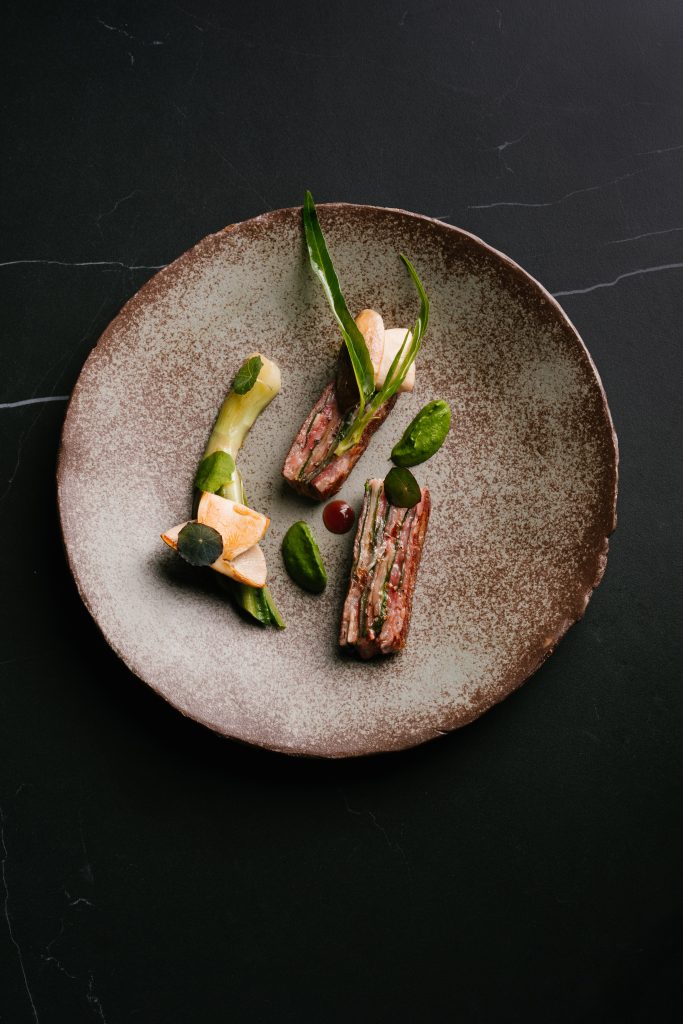
How do you see sustainability evolving in Hong Kong’s fine dining scene, and how do you hope to play a role in that?
Or rather, how is sustainability shaping culinary creativity and the future of fine dining?
Ekkebus: Hong Kong was a long-time dream of mine – to me this city has something magical. I arrived in Hong Kong 20 years ago, and I was not disappointed; I was amazed by the energy of this world city, the amazing skylines and of course the fine foods. But it didn’t take long to see that Hong Kong is also burning the candle at both ends. I noticed Hong Kong’s consumer opulence, the unstoppable appetite for exotic seafood, rich protein diets, challenges of waste management, social inequality, and I wanted to drive change to reduce our impact on climate change. Climate change is the greatest environmental challenge of the 21st century and the consequences are quickly mounting. We must channel our resources into turning the deteriorating trends around. Compared to some of the most vulnerable places on Earth, Hong Kong faces nowhere near the same magnitude of threats or environmental degradation. Still, we must work much harder to achieve our sustainable development goals by 2030, alongside our pledges of carbon neutrality by 2050 and zero landfills by 2035. Governments can set and enforce regulations, provide incentives, educate and raise awareness, and collaborate internationally to promote sustainable development. But businesses and our individual efforts have a critical role to play in driving change and reversing climate change.
Rousseau: In a positive way, I exchange quite a bit with other chefs about my sourcing, and they seem quite enthusiastic when they discover various products. For me, following the short supply chain forces me to think more about how to use a product well, thus bringing more creativity to my dishes.
Catterall: I think there will be a bigger focus on plant-based dishes and hyper-seasonal menus or dishes. Within this shift, there will be a move away from expensive imported items and a renewed focus on ingredients that we can source locally. Events like this one help reshape the conversation, and I hope to keep collaborating and pushing forward toward a more sustainable future in fine dining.
Lau: Sustainability has become an integral part of Hong Kong’s fine dining scene, and I believe it will continue to evolve into one of the key pillars of culinary creativity in the coming years. Both chefs and diners are becoming increasingly conscious of the environmental impact of food choices, which is driving the industry towards exciting innovations – whether through reducing waste, sourcing locally or reimagining how ingredients are utilised. As everything shifts, so too will the way we dine, with our relationship with technology playing a significant role in transforming how we approach and experience food.
Also see: Hong Kong’s Bar Leone takes the No.1 spot for The World’s 50 Best Bars 2025
What sustainability challenges are unique to operating in Hong Kong, and how do you navigate them?
Ekkebus: There are very few restaurants and, for that matter, hotels in Asia that have such a comprehensive sourcing programme as we do. We prioritise sourcing organic, local and regional to reduce carbon footprint, predominantly working with organic farms (fruit, vegetable, pig and poultry) from Hong Kong’s New Territories. Buying from local producers gives us access to seasonal, fresh food with a smaller carbon price tag. It’s also a valuable investment into the local economy and helps establish thriving food networks and protects Hong Kong’s food heritage. Where we cannot source local, most of the time we source regionally, from organic farms in southern China, Taiwan and Kyushu (Japan) and, only when even those are not possible, organic from Australia and Europe. All our ingredients are thoroughly scrutinised before being featured on our hotel’s menus. We care that all our animal proteins are ethically raised, antibiotic- and growth-hormone-free, and where appropriate, grass-fed, free-roaming or organic, sustainably sourced and raised by people who share our values about sustainability. And we get audited by an independent auditor to ensure our hotels are compliant with our own set of policies and procedures. This audit is annual, and the results are Balanced Scorecard–related for all team members.
Rousseau: The weather sometimes makes transportation or harvesting difficult. But we have a unique menu at Feuille, which gives me the freedom to modify my dishes at any time.
Catterall: Because Hong Kong is such a small geographical area, it depends heavily on imported produce, which creates high carbon emissions. At Roganic, we choose to see this as a creative challenge rather than a restriction. It encourages us to explore new ingredients and new ways to use them, which often leads to exciting and original dishes.
Lau: One of the biggest sustainability challenges in Hong Kong is the limited availability of fertile land for farming. Being such a densely populated city, space is a precious commodity and land suitable for agriculture is extremely scarce. This makes it difficult to grow a consistent variety of local produce, which is further complicated by the city’s hot and humid climate, as well as unpredictable weather events like typhoons and heavy rain. These environmental factors can disrupt supply chains and the quality of ingredients, forcing us to find creative ways to source sustainably while maintaining high standards for fine dining.
Another unique challenge is the local dining culture. Hong Kong diners tend to be very seafood- and meat-centric, which makes it harder to shift focus toward plant-based dishes and encourage people to embrace vegetables as the centrepiece of a meal. It’s a cultural preference that requires education and inspiration – we need to show diners how vegetables can be just as exciting and satisfying when treated with the same level of creativity and care as seafood or meat.
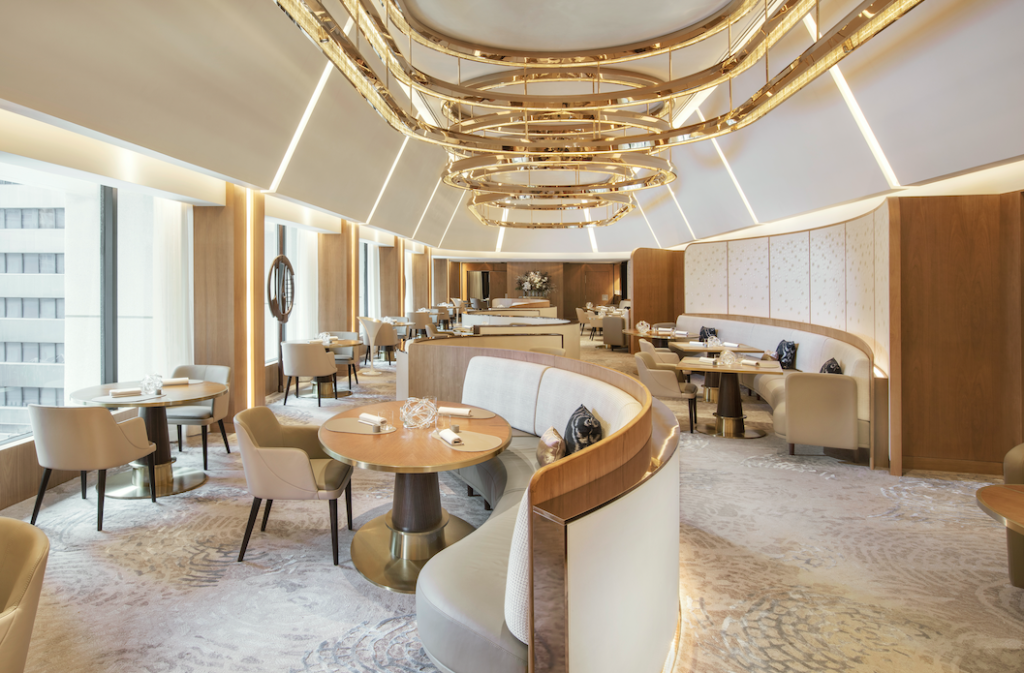
What has been the hardest thing to implement for a sustainable future, and what has been most groundbreaking?
Ekkebus: Convince the guest that what we do is better for the planet, better for the community, better for their health. Hong Kong is among the highest consumers of animal proteins and seafood in the world, and the biggest challenge has been to reduce the amount of protein a menu possesses. This has been our mission from day one. We favour plant-based options – making our menu less meat-centric reduces our overall environmental impact and resonates with the growing number of diners in Hong Kong, who believe that a good meal doesn’t require large quantities of meat and seafood. And at Amber, we aim constantly to have a 35:65 ratio between animal protein and plant-based ingredients in our menus.
Rousseau: Coming directly from France and knowing no one in Hong Kong, finding good producers was challenging. It took us time to find and shape what we have today. Fermentations are, for me, an innovative touch at Feuille. It also allows me to prolong the enjoyment of a seasonal fruit or to work on drinks and condiments that elevate a dish.
Catterall: Recycling/reusing have probably been the most difficult things to implement as the infrastructure in Hong Kong is still developing. However, I’ve been really impressed by the developments in recent years and think this will continue at a rapid rate as sustainability becomes more of a priority.
Lau: The hardest challenge has been the lack of fertile land in Hong Kong, which limits local farming and forces reliance on imported ingredients. However, the most groundbreaking development has been the rise of innovative solutions like vertical farming and hydroponics, along with growing support for sustainability from both farmers and diners.
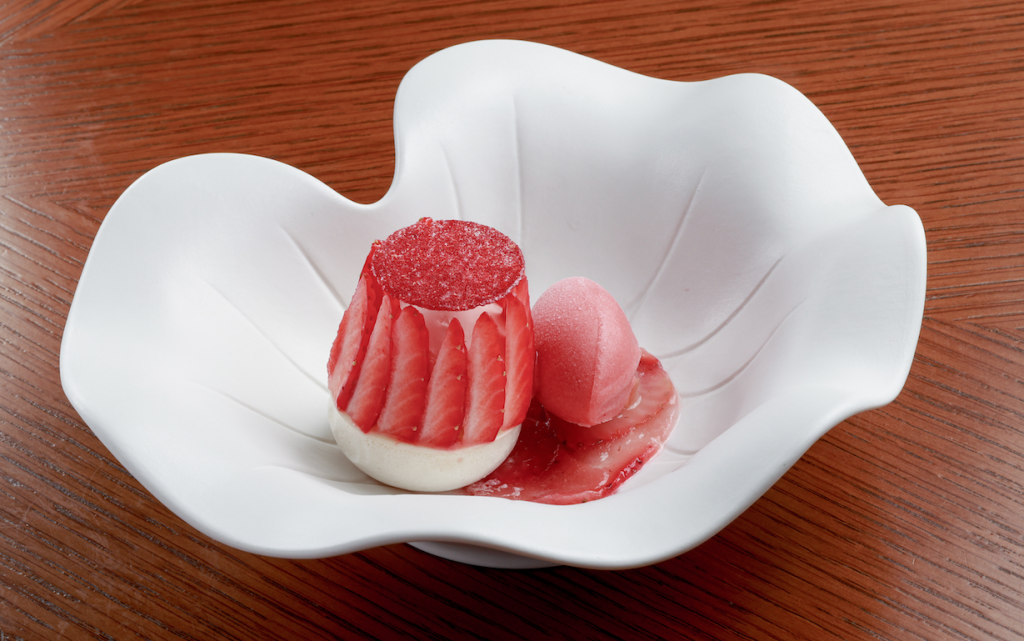
What do you think are the most accessible learnings to be shared with other restaurants?
Ekkebus: Our supplier list – these are small businesses and need support. Collectively, we can support and ensure they are not just surviving but that they thrive.
Rousseau: Local sourcing and minimising waste in the kitchen.
Catterall: Reducing food waste wherever possible by preserving or using byproducts in other dishes or drinks pairings. With our climate becoming more and more unpredictable, preserving is essential to see us through peaks and troughs in the season. Both of these methods of waste reduction are really simple and just require a little bit of creativity and effort. It’s my long-term commitment to inspire other restaurants to join the movement toward sustainable dining, so I’d encourage chefs to talk among their network to ask for advice. We need everyone to join together to truly make a difference.
Lau: The most accessible learnings are how to find quality ingredients from around the region and how to use them creatively. Exploring regional produce not only supports sustainability but also inspires new techniques and flavours that any restaurant can incorporate into its menu.
Also see: Soho House Hong Kong: Turkish cuisine in the heart of Sheung Wan


